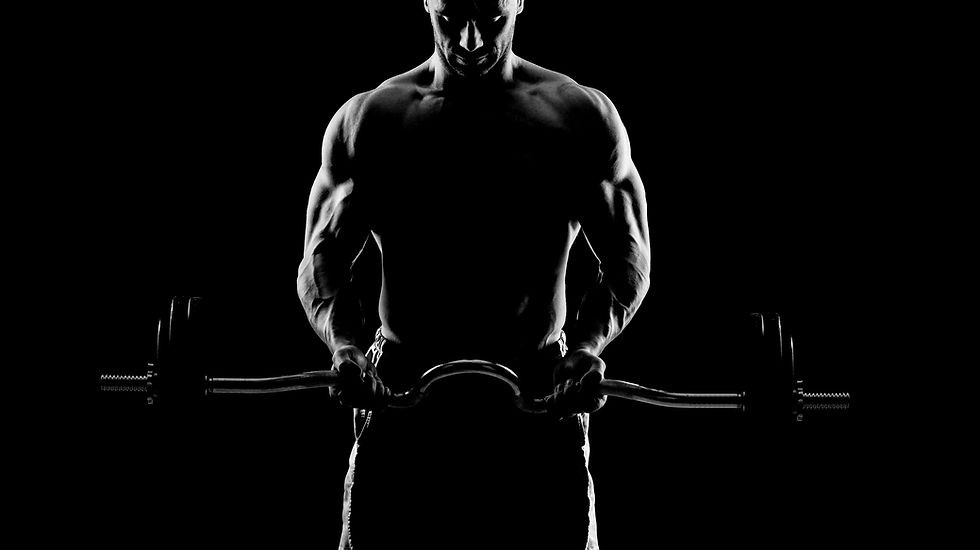Bodybuilding on a Vegan Diet
- Chelsi Brown
- Sep 21, 2018
- 4 min read
Updated: Jul 29, 2024
Guest post by dietetic intern, Chelsi Brown

As both an animal lover and casual bodybuilder, I have found it difficult to reconcile the need for high protein intake during training with my ethical beliefs that support the vegan or plant-based diet and lifestyle. This concern has been my biggest obstacle to going vegan, or even vegetarian! While I have come across plenty of stories and research of successful vegan endurance athletes, I wonder, is bodybuilding on a vegan diet possible?
Nutritional Phases of Bodybuilding
In the bodybuilding world, there are two commonly referenced phases of competition preparation in relation to dietary choices: bulking, and cutting. While there is a third phase known as maintenance, the results of the bulking and cutting phases tend to be the most sought after and focused on.
During the bulking phase, the goal is to increase muscle size, a process also known as muscle protein synthesis. Once this has been achieved, body composition improvements (primarily in the form of fat loss) occur during the cutting phase.
Nutritionally speaking, macronutrient composition changes between these two phases. The bulking phase is characterized by a high carbohydrate, moderate protein diet, with moderate fat intake and a caloric excess, whereas a low carbohydrate, high protein diet, with moderate fat intake and a caloric deficit is followed during a cutting phase.

The International Society of Sports Nutrition states that consuming 1.4 to 2.0 grams of protein per kilogram of body weight per day is sufficient for building muscle, but there is some evidence that a high protein intake of 3 or more grams per kilogram per day could improve body composition in individuals that are resistance-trained. In other words, individuals interested in reducing their body fat percentage and/or are in the cutting phase of their program could benefit from eating higher amounts of protein than they do during their muscle building (bulking) phase.
Furthermore, it is recommended for athletes to divide their protein consumption into 4 to 6 servings of 20–40 grams per serving. Bodybuilders specifically tend to follow the guideline of 1.6 to 2.2 grams of protein per kilogram per day (or about 1 gram of protein per pound of body weight per day) for bulking, and 1–3 grams per kilogram per day for cutting. To give you some perspective, this means that, according to these recommendations, a 120 pound female would need to consume about 76–120 grams of protein each day during her bulking phase, and anywhere between 120–163 grams during her cutting phase. That would be 6 servings of 20 grams of protein every day.
Here are some plant-based equivalencies:
1 cup tofu
1/3 cup seitan
1 Beyond burger
3 ounces Hempeh
100 grams tempeh (about 3 ounces)
1 cup cooked black beans (15 grams protein) + 2 Tbsps hemp seeds (6 grams protein)
1 cup cooked lentils (18 grams protein) + 1 Tbsp hemp seeds (3 grams protein)
4 ounces chickpea pasta
2 slices Dave's bread plus 2 1/2 Tbsps peanut butter
1 cup brown rice (4.5 grams protein) + 1 cup black beans (15 grams protein)
Each of these choices contain about 20 grams of protein. Not to mention many of your vegetables, whole grains, nuts and seeds will contribute to your protein intake as well.
Okay, so it can be done! But let’s take a look at the comparison of animal and plant protein…
Animal vs. Plant Protein Sources
While animal proteins are complete proteins – meaning they contain adequate amounts of all nine essential amino acids – it is specifically the branched-chain amino acids, and leucine in particular, that stimulate muscle protein synthesis, a marker of the bulking phase.
Editor's note: All plant-based foods also contain adequate amounts of all nine essential amino acids. Some, like hemp seeds, soy products, pistachios, and chia seeds, contain sufficient amounts of all nine essential amino acids. While others contain all nine essential amino acids, they may be low in one or two amino acids. The key to getting sufficient essential amino acids on an exclusive plant-based diet is to consume enough calories and a wide variety of protein-rich plant-based foods.
Compared to whey protein isolate, which is a common supplement used by those in the bodybuilding community, there is a lower leucine content in plant-based proteins. Per 100 grams of pea protein, there are 6.4 grams of leucine, compared to 8.6 grams in 100 grams of whey protein. In rice protein, there is about 8% leucine, whereas whey is 11.5%. There is also a lower total amino acid appearance in the blood following rice protein ingestion compared to whey protein ingestion.
However, one study has found that adding a plant-protein specific digestive enzyme blend to the plant protein, there was no longer any significant difference between the amount of amino acid appearance in blood following rice or whey protein consumption.

With regards to training results, significant performance differences have not been demonstrated between athletes supplementing with plant-based protein and those supplementing with whey protein. Muscle thickness, muscular strength, lean body mass, and perceptions of recovery are similar in both groups of athletes when they have been following identical resistance training programs. Not to mention, that with plants you also receive healing phytonutrients, powerful antioxidants and gut-loving fiber.
Bodybuilding on a Vegan Diet
Considering the current research, plant-fueled athletes can achieve the same success in the bodybuilding world as a meat-eater. I want to know, would you make the switch… or are you stuck in your “wheys?”

Chelsi Brown is a graduate student of the Coordinated Program in Dietetics at Georgia State University. With a background in exercise science and health coaching, she aspires to one day be a sports dietitian, helping athletes to perform and feel their best! In her free time, you can find her at the local gym, playing with her pup Buffy, or dancing her heart out at music festivals.

